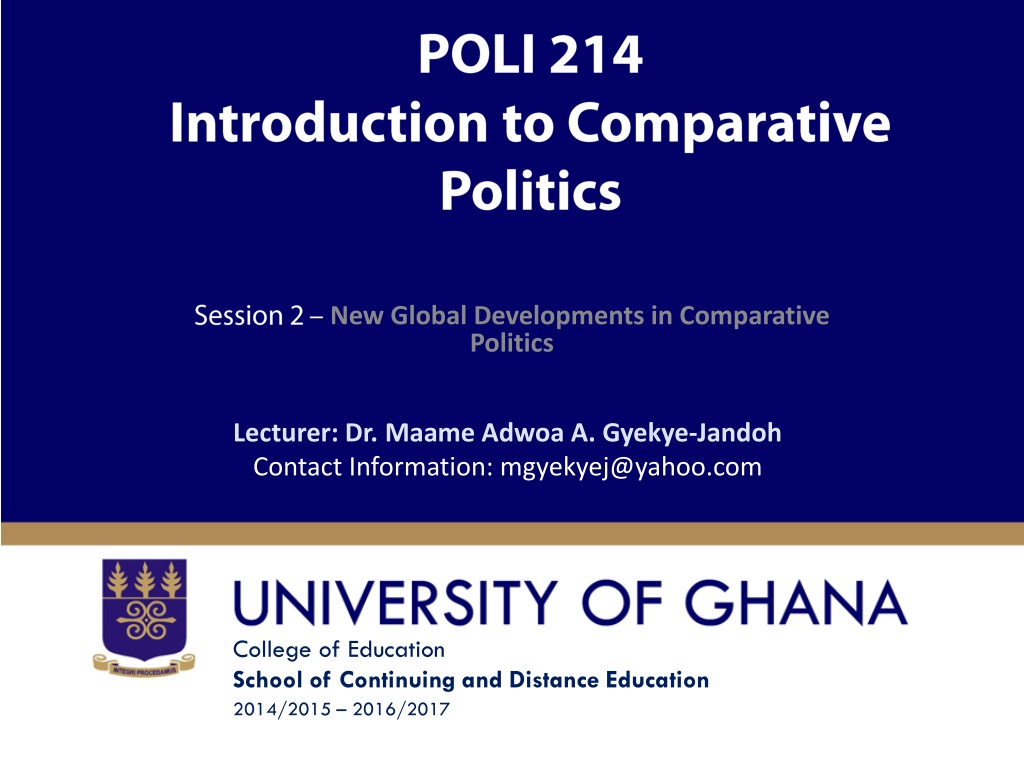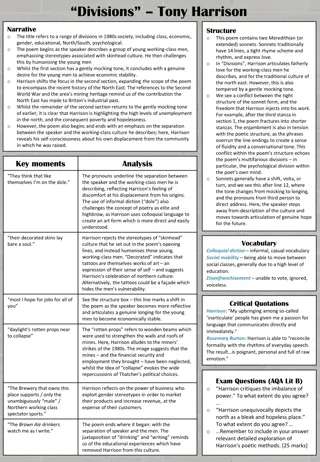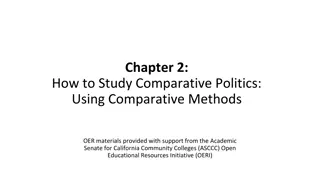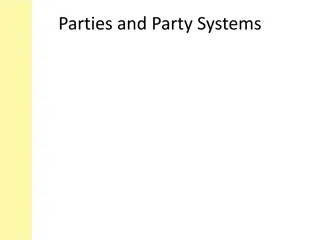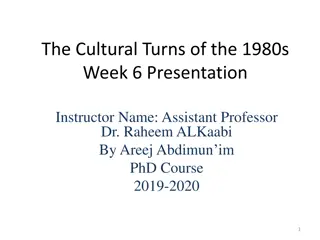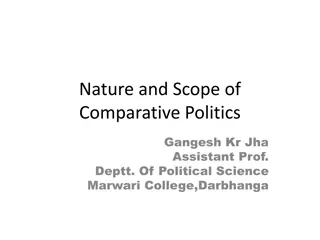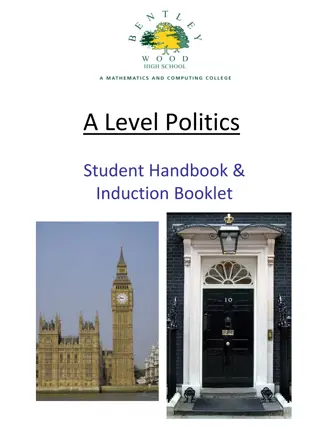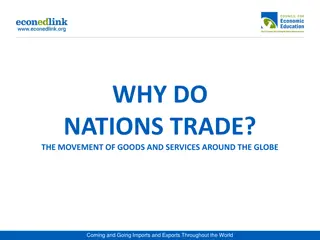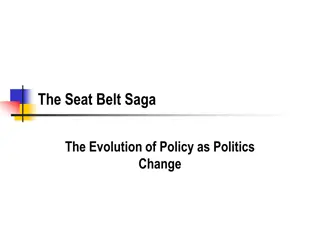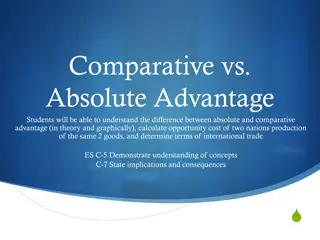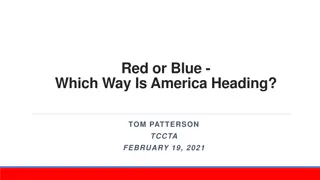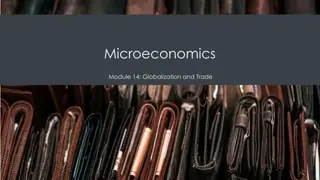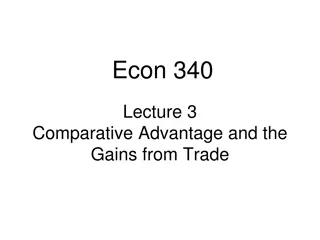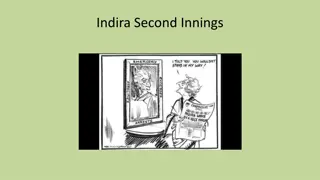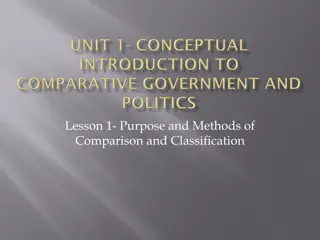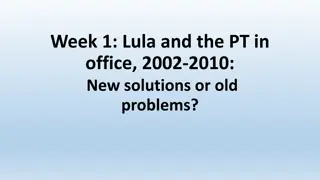New Global Developments in Comparative Politics Since the 1980s
The lecture by Dr. Maame Adwoa A. Gyekye-Jandoh explores new global developments in Comparative Politics since the 1980s, covering topics like rapid industrialization in Asia and the collapse of communism in the Soviet Union and Eastern Europe. Students are introduced to key concepts such as the Comparative Method, Political Institutions, and the reconciliation of individual freedom and collective equality. Recommended reading includes Essentials of Comparative Politics by Patrick H. O'Neil.
- Comparative Politics
- Global Developments
- 1980s
- Political Institutions
- Dr. Maame Adwoa A. Gyekye-Jandoh
Download Presentation

Please find below an Image/Link to download the presentation.
The content on the website is provided AS IS for your information and personal use only. It may not be sold, licensed, or shared on other websites without obtaining consent from the author. Download presentation by click this link. If you encounter any issues during the download, it is possible that the publisher has removed the file from their server.
E N D
Presentation Transcript
New Global Developments in Comparative Politics Lecturer: Dr. Maame Adwoa A. Gyekye-Jandoh Contact Information: mgyekyej@yahoo.com College of Education School of Continuing and Distance Education 2014/2015 2016/2017
Session Overview Overview Session 1 introduced students to the meaning of Comparative Politics, the Comparative Method, and Debates in Comparative Politics. This session is intended to simply highlight some of the new global developments that took place beginning in the 1980s that shook the very foundations of Comparative Politics. These developments resulted in a shaking up of some of the long-standing ideas that had taken hold in Comparative Politics for many years. Students will also be introduced to one of the guiding approaches used by many comparativists in their work the focus on, or use of, Political Institutions as a guide in the business of research into political phenomena. This session will also share the importance of political systems attempt to reconcile two equally necessary goals and values of politics: individual freedom and collective equality. This is at the core of politics and Comparative Politics. Slide 2
Session Outline The key topics to be covered in this session are as follows: Topic One: New Global Developments since the 1980s Topic Two: Political Institutions: A Guiding Approach Topic Three: Reconciling Freedom and Equality: A Guiding Idea Slide 3
Reading List Chapter 1 of Recommended Text Essentials of Comparative Politics (2007) by Patrick H. O Neil. Slide 4
Topic One NEW GLOBAL DEVELOPMENTS SINCE THE 1980S Slide 5
New Global Developments since the 1980s Beginning in the 1980s, new and unforeseen developments on the global scene took the Comparative Politics academic community by surprise. 1. One new development was rapid industrialization in Asia, particularly in Taiwan, South Korea, Singapore, and China. This rapid industrialization generated huge economic growth. Some comparativitists asked: was it culture, specific trade strategies, or non-democratic governments that could ignore public opinion and sacrifices for the greater good? Comparative Politics scholars sought to explain this change in Asia, which had challenged prior views that poorer countries could not progress because of US and European domination (O Neil 2007). Slide 6
New Global Developments since the 1980s 2. The collapse of communism in the Soviet Union and Eastern Europe. In 1989, Eastern Europe rejected communist rule, beginning with Romania, then Poland and the Czech Republic, etc. In 1991, Soviet leader Gorbachev s reforms (glasnost and perestroika) ironically led to the breakup of the Soviet Union. Comparativists did not foresee this impact of the political and economic reforms begun by Gorbachev (O Neil 2007). 3. The third wave of democracy beginning in the 1970s, then 1980s and 1990s. Many countries in Asia, Latin America, Europe, and Africa shook off authoritarian rule. Comparativists were interested in finding out the roots of this relatively rapid and unexpected democratization. They were forced to rethink the very future of politics and the role of the Comparative Politics field (O Neil 2007). Slide 7
Questions Name and briefly explain two new global developments that took place from the 1980s that shook the Comparative Politics field. In what way did the third wave of democracy surprise Comparativists? Briefly explain what the Arab Spring could mean for Comparative Politics to a friend. Slide 8
Where is Comparative Politics Now? O Neil (2007) argues that the aftermath of the unexpected third wave of democratization is where Comparative Politics is now. It has had to grapple with the fact that longstanding authoritarian governments in Latin America and Africa, for example, have fallen and these countries have embarked on democratization projects. Huntington (1986), for example, has argued that in the absence of major ideological distinctions between countries, political divisions will fall primarily along cultural, ethnic, and religious lines (O Neil 2007). Slide 9
Where is Comparative Politics Now? (contd.) Note that one major development occurred in 2011 what has been termed the Arab Spring (in Tunisia, Egypt, and Libya) which has questioned the views of some scholars that Islamic countries are almost locked into repressive and authoritarian regimes some of which would be difficult to overcome because of their religious and cultural underpinnings. This latest development is a very important one as it questions the view that some cultures and regions of the world are more prone to and likely to demand democracy than other cultures and countries, and highlights the fact that indeed, as Amartya Sen has argued, democracy may yet be a universal value. Slide 10
Topic Two POLITICAL INSTITUTIONS: A GUIDING APPROACH Slide 11
Political Institutions Defined Political institutions, you must note, have been defined as any organizations or patterns of activity that are self- perpetuating and valued for their own sake. 2. They embody norms or values considered central to people s lives, and are therefore not easily dislodged or changed. 3. They can affect the behaviour of individuals and political leaders, and can in turn be affected by them. Examples include elections, courts, legislatures, the army, taxation, and electoral systems (O Neil 2007). Slide 12
Political Institutions as a Guiding Approach Political institutions, it has been argued, are a useful way to approach the study of politics and Comparative Politics because they set the stage for political behaviour by influencing how politics is conducted. Political institutions are critical because they are constructed as patterns that can influence individual political behaviour and be influenced by the behaviour and decisions or choices of politicians and other political players. Thus, institutions are not merely the result of politics, but can also be an important cause (O Neil 2007). Slide 13
Political Institutions as a Guiding Approach (contd.) O Neil (2007) argues that the return to the study of institutions in many ways combines the traditional and behavioural approaches. Institutional approaches take their emphasis on cause and effect relationships from behaviouralism, and their description of institutions and their functions from the traditional approach. Questions: In your own words, how would you define political institutions? Give two reasons why political institutions are a guiding approach of most comparativists. Slide 14
Topic Three RECONCILING FREEDOM AND EQUALITY: A GUIDING IDEA Slide 15
Freedom and Equality Defined O Neil (2007) argues that people strive for political power in order to be able to achieve some level of individual freedom and collective equality for citizens. The substance of politics is at its core bound up in the struggle between individual freedom and collective equality. Freedomis defined by O Neil (2007) as the ability of an individual to act independently, without fear of restriction or punishment by the state or other actors. It includes free speech, free assembly, freedom of religion, and other civil liberties. Equality, on the other hand, is a shared economic standard of individuals within a community, society, or country. Freedom and equality are interrelated and affect political power (O Neil 2007). Slide 16
Freedom and Equality as a Guiding Idea It is important to note that a greater emphasis on individual freedom is associated with a greater decentralization of political power, while a greater focus on collective equality is connected with a greater centralization of political power. The United States, for example, has one of the highest degrees of both personal freedom and economic inequality in the world. Greater personal freedom implies a smaller role for the state and limits on the state s power to redistribute income through welfare and taxes. On the other hand, too much of a focus on economic equality may erode personal freedom. Demands for greater economic equality may lead to a government s greater control of private property and personal wealth in the guise of redistribution of income. Note, however, that when economic and political powers are concentrated in one place, individual freedom may be threatened. O Neil (2007) argues that while institutions serve as a map to political activity, the goal of that political activity should be to reconcile the competing values of individual freedom and collective equality. Although this is quite difficult to do, striving to strike some balance between promoting freedom and equality would help construct a better political order and better politics. Slide 17
Questions If freedom is promoted primarily in a political system, what is the opportunity cost or risk incurred? What is the drawback of promoting equality primarily in a political system? Briefly define freedom and equality. Slide 18
Conclusion of Session Two In this session, you have become familiar with the major global developments that took place in the late 20th century that re-injected new life and puzzles into the field of Comparative Politics, to the nature of political institutions, and to the fact that most comparativists use political institutions as a guiding approach to the study of politics. This is because political institutions are influential drivers of political behaviour and politics, but they can also be created and affected by political leaders and their behaviour. In addition, you have been introduced to the competing goals and values of freedom and equality and why it is quite difficult to promote the two at the same time. One cannot however give up a balance must be sought between promoting freedom and equality. The next session will discuss and analyze the important concepts of States, Nations, and Society. Slide 19
References O Neil, Patrick H. (2007) Essentials of Comparative Politics. New York; London: Norton. 2nd edition. O Neil Patrick H., Field, Karl, and Don Share (2006). Cases in Comparative Politics. New York; London: Norton. 2nd edition. Slide 20
